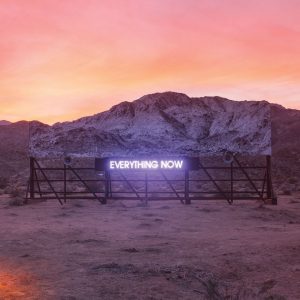Jacob Bender originally presented this piece as a paper at the annual conference of Mormon Scholars in the Humanities, 24 March 2018 at Brigham Young University in Provo, Utah, USA.
Enough interviews and online sources have casually mentioned that Win Butler, the front-man for indie darlings Arcade Fire, was raised in a conservative Mormon household (and that as a mere biographical footnote), that I think I can safely assume it a fact, and not just another of those Steve-Martin-hometaught-Christina-Aguilera type urban legends. Nevertheless, the point need not be belabored that Arcade Fire is very obviously not a Mormon band, neither sympathetic with nor openly antagonistic against the LDS Church, or even making passing mention to it (they take neither the Brandon Flowers nor the Tyler Glenn approaches). Now, Arcade Fire is a band clearly preoccupied with religion generally —their second LP is entitled Neon Bible after all —but whether or not Butler is merely non-practicing nowadays or straight-up ex-Mormon is largely irrelevant to enjoying the music of Arcade Fire.
However, to paraphrase Vladimir Nabokov speaking of James Joyce’s Catholicism, Butler may have left his religion but not its categories. I hope I am not projecting myself too much here when I say that, to my conditioned ear, there are moments in Arcade Fire’s lyrics when his childhood Mormonism peaks through —even if only to critique what he was once taught —yet still it’s there, and I think an understanding of those distinctly LDS allusions may help to further flesh out one’s appreciation for Arcade Fire’s music.
Now, this paper is in part an expansion of some little musings I once posted to a personal blog that scarcely circulated beyond a narrow readership of friends and family, and which I maintained for no other reason than my own idle bemusement. Hence, you can imagine my intrigue when the comments section attracted a small number of total strangers—ex-Mormons who had apparently used Arcade Fire to process their own exit from the Church. One commentator called attention to the explicit baptism imagery in the “Afterlife” video from the Reflektor album. Another believed that the lyric “If I was yours…but I’m not” (from “Ready to Start” off their 2010 album The Suburbs), could be read as an implicit rejection of the Primary song “I belong to the Church of Jesus Christ…” Apparently, Arcade Fire has touched some small nerve among certain of the ex-Mormon set, which I suspect is worth exploring for more reasons than idle bemusement.
Ah, but I’m getting ahead of myself. Let’s consider a brief excerpt from their hands-down most iconic song, “Wake Up,” from their 2004 debut Funeral. I always find it fascinating that he sings “I guess we’ll just have to adjust,” but then never actually finished saying the word “adjust,” as the word melts into the chorus, but we’ll return to that in the end.
For purposes at present, what’s important is that in this anthem, which eulogizes the inevitable angst and heartbreak and euphoria that comes from growing up, the climactic line declares, “We’re just a million little gods causing rainstorms/turning every good thing to rust!” Now, one could here argue that, given that the following line will be “With my lightning bolts a-glowing…” the reference to “a million little gods” is likely a reference to some Greco-Roman pantheon—a sort of neo-pagan rejection of Christendom, which is a common artistic trope that dates back to the late-Victorian aesthetes of the fin-de-siecle. Nevertheless, it is worth asking here what exact form of Christianity Arcade Fire here is rejecting—or at least reformulating.
As for myself, I can’t help but hear in this line what is (to my knowledge) the very unique LDS belief that all human beings are children of God in the most literal sense, “and if children, heirs also, heirs of God and fellow heirs with Christ, if indeed we suffer with Him so that we may also be glorified with Him” (Romans 8:17)—that is, our eternal potential is to become Gods as well.
I believe that Win Butler is cleverly interrogating this belief by noting that, if we are all “a million little gods”—in embryo, if nothing else—then our potential to create is matched only by our infantile ability to destroy all that is good around us (as God Himself declares in Genesis, “Behold, the man is become as one of us, to know good and evil”, and with our human weakness invariably leaning towards the latter). And as sad experience has shown, maybe he’s right.
But the really meaty LDS allusions for me come on their sophomore effort, 2007’s Neon Bible. I wish in particular to examine my personal favorite track, Antichrist Television Blues.
The song is a story about a self-declared “God-fearing man” who pushes his talented singer of a daughter into show business (the working title was purportedly “Joe Simpson Blues”). The song’s narrator spends most the song trying to convince himself that by doing so he’s fulfilling God’s plan, singing “I just gotta know if it’s part of your plan/To seat my daughter there by your right hand”. All the while, however, he fears he’s not, singing, “Lord, would you send me a sign/Cause I just gotta know if I’m wasting my time”. The track builds up to the final line where he passionately pleads, “O tell me Lord, am I the antichrist.” Now, this song, like so much of Neon Bible, speaks to anxieties common to many religions; it’s in the details, then, that his Mormon upbringing peeps out:
For example, the line “My lips are near but my heart is far away” is a direct allusion to Isaiah 29:13; in Mormonism, this is the scripture cited by Jesus Christ Himself to Joseph Smith, when the Lord explains to the boy prophet why he is not to join any existing church. Thus, in Mormonism, to say that “My lips are near but my heart is far away” is to make an abject confession of complete apostasy, to feel one’s self terribly withdrawn from the presence of God. It is a scripture that Win Butler would have been familiar with growing up, and he most likely understood its full passionate import when he used it here.
Likewise, the lyric “You’ll always be a stranger in a strange, strange land” alludes to Hebrews 11:13, and is often cited within the LDS faith to express our belief that we existed Pre-Mortally as spirits, that we are in fact strangers and pilgrims upon this Earth; while the line “I’ll be your mouthpiece” expresses the LDS belief that the Prophet is the mouthpiece of God —but with this caveat, that in Mormonism, one cannot wish to be His mouthpiece, for God must choose a Prophet for Himself. Therefore, to aspire to Prophethood, to presume to tell God who He should choose, is to sin in Mormonism. Thus, the singer’s fear of being the antichrist is derived in part from him seeking an honor that he is expressly forbidden to seek for himself.
The rest of Neon Bible likewise feels littered with small LDS moments: the full name of the LDS Church is of course The Church of Jesus Christ of Latter-day Saints, which name expresses an expectation for the imminent Second Coming of Christ, an event of which even the angels know not “that day and hour” (Matthew 24:36) —or, as in the lyrics to Keep the Car Running, “they don’t know where and they don’t know when it’s coming/oh when, but it’s coming”; Intervention in turn repeats Christ’s warning from the Sermon on the Mount that once in prison you cannot pay even one farthing, for “I know no matter what you say/There are some debts you’ll never pay”; that same song likewise sings of a soldier “Working for the Church while your life falls apart,” a line that can be read as an interrogation of the demands Church service can make on one’s family (for though our lack of a professional clergy may make our religion more participatory, nonetheless our lay-ministry can also make brutal demands on the spare time of our members).
Furthermore, Butler critiques the LDS doctrines of agency with Ocean of Noise‘s “Now who here among us/Still believes in choice/Not I”, as well as the necessity of the body and the spirits’ union for a fullness of joy with My Body is a Cage “that keeps me from dancing/with the one I love” —and I don’t think he would’ve engaged with these ideas if he hadn’t been raised hearing all about them; My Body is a Cage also sings “I’m living in an age/That calls darkness light”, another Isaiah reference oft used in Church talks and rhetoric.
Moreover, The Well & The Lighthouse, with its line “Resurrected/Living in a lighthouse/If you leave the ships are gonna wreck…The lions and the lambs ain’t sleeping yet” accomplishes the following: 1) it references belief in the resurrection; 2) expresses the anxiety of being responsible for another’s salvation if you don’t warn them (a common theme in Mormon missionary talks) by appropriating the lighthouse imagery from the hymn “Brightly Beams Our Father’s Mercy”; and 3) frets that though we await it, the Millennial day has not yet arrived when “the lion and lamb shall lie down together” (which of course is yet another Isaiah allusion! Butler, at least, has taken seriously Christ’s admonition to “search ye the words of Isaiah”).
Stepping back away from the scriptures for a moment and focusing more on general LDS cultural mores, there is currently, as you all know, a blight of far too many North American Mormons being seduced into Summer Sales, pyramid schemes, and a general, self-defeating desire for wealth. I therefore can’t help but hear Butler (quite justifiably) sing against such specific hypocrisies in lines like “It cares not for your pyramid schemes” (from Black Mirror), “I don’t want the salesmen knocking at my door” (from Windowsill), and “You never trust a millionaire quoting the sermon on the mount” (from City With No Children In It from The Suburbs).
 Their 2013 album Reflektor also can’t help but creep in some references to Butler’s childhood faith; there is of course the line “praying to the resurrector” (which “turns out it was just a reflector”) from the album’s title track. And I hope I can be forgiven for hearing in “just a reflection of a reflection/of a reflection of a reflection/of a reflection” the sealing room (or marriage room) inside an LDS Temple, which always contain two mirrors opposite each other, reflecting back endlessly, representing eternity —you literally see yourself a reflection of a reflection of a reflection of a reflection.
Their 2013 album Reflektor also can’t help but creep in some references to Butler’s childhood faith; there is of course the line “praying to the resurrector” (which “turns out it was just a reflector”) from the album’s title track. And I hope I can be forgiven for hearing in “just a reflection of a reflection/of a reflection of a reflection/of a reflection” the sealing room (or marriage room) inside an LDS Temple, which always contain two mirrors opposite each other, reflecting back endlessly, representing eternity —you literally see yourself a reflection of a reflection of a reflection of a reflection.
And then, from the same track, there’s the line “If this is heaven/I don’t know what it’s for/If I can’t find you there/I don’t care”, which is a sentiment I actually once heard from a YSA Bishop up in Idaho, who, in an unguarded moment one Sunday, as he spoke of his great love for his family, said if he made it to the Celestial Kingdom, but the rest of his family didn’t…then he didn’t want to be there. These are not ideas alien to LDS doctrine.
Then there’s the dance number Here Comes the Night Time, which contains the line: “The missionaries tell us we will be left behind.” Granted, the “left behind” rhetoric is far more Evangelical than LDS, nevertheless “missionaries” generally are far more identified with the latter than the former. But it’s another, less obvious line from the same song that I can’t help but note: “If there’s no music up in heaven/then what’s it for?”
For if Butler really was raised in a conservative Mormon household, then he and I probably have the same experience: that of being made to feel vaguely guilty for loving music with non-Church-related content. Not that the LDS Church is anti-music or anything —we have the incomparable Mormon Tabernacle Choir after all —but throughout many of our childhoods, North American youth are “encouraged” by our manifold Seminary and Sunday school teachers to “only listen to music” that is “uplifting” and “edifying” and that “doesn’t offend the spirit,” and other such lazy, vague, and meaningless adjectives that are meant to guilt us into enjoying the Saturday’s Warrior soundtrack or what have you.
Of course, the typical criteria for “worthy music” was never whether or not a song resonated deeply and profoundly with your soul, or helped you heal in moments of passion and crisis, but only if it was “inoffensive” —which ironically is the most offensive music of all. But if certain secular music is good, and “every good gift comes from God” and we are to “lay hold of every good thing,” then it can feel like a downright crisis of faith to deny ourselves of it. I of course don’t know why Win Butler drifted away from Mormonism, but I can make an educated guess that the rhetoric of inoffensive music was at least one of the reasons why.
The LDS references aren’t nearly as explicit on their most recent LP, last summer’s Everything Now—although the deep-cut “Put Your Money On Me” does contain suggestive lines such as “Trumpets of angels call for my head”, and “Sitting on the carpets of the basement of heaven/We were born innocent, but it didn’t last a day” (which could potentially reference the 2nd Article of Faith, rejecting the doctrine of Original Sin while still acknowledging how little that actually helps us).
The lyrics to the title-track itself appear to indicate that “Everything Now” is an interrogation of how overwhelmed we all feel by our collective, immediate, and total access to all media at once in our hyper-digital age. Of course, that title can also be read as an exclamation for how overwhelmed we feel at everything happening in the world right now. I would like to suggest that there is a third potential reading of that title: that we are overwhelmed by Everything Now—that is, with the restoration of all things, we now have spread before us all principalities, all powers, thrones, kingdoms, worlds without numbers, from all eternity to all eternity—and that frankly frightens us. As Hugh Nibley once said, we have the feeling that it is all too good for us—because it really is all too good for us! How low, vain, and trifling have been our conversations, said Joseph Smith from Liberty Jail—but we have kept them low, vain and trifling because we prefer it that way.
But that limited vision is not how the Church came into being, nor is it why people join —though it may in fact be at least part of the reason why some people leave. To once more paraphrase Nabokov, Win Butler may have left his religion but not its categories —and the category that defines his music through all its many permutations, is his will-towards-transcendence. From “Wake Up” to “Windowsill” to “Mountains Beyond Mountains” to “Supersymmetry” to “Infinite Content,” this pull towards the transcendent has weaved its way through the collected works of Arcade Fire. Again, when he sings “I guess we’ll just have to adjust” —that is, compromise, resign ourselves, settle into the thousand petty concerns of adulthood —he never actually finished articulating the word “adjust,” because deep down, he doesn’t feel like we should. There are greater and better things out there for us.
Why does any of this matter, anyways? Because with the plateauing of growth that has occurred in the Church lately, I would argue that part of the problem is that we have lost sight of precisely that which perhaps makes our religion most attractive: the promise of the infinite and eternal, which is something that in our summer sales and pyramid schemes we will scarcely face up to ourselves. We’re just a million little gods, but shrink away even from even being that. And when our own youth in turn aren’t made to feel those the grandeur of those promises and possibilities, they will look elsewhere for it —or at least explore other modes for expressing a desire for it. Perhaps if the music of Arcade Fire does nothing else, it reminds us of what those who leave the faith are aching for—and, quite frankly, what we ourselves should be aching for as well, what our own religion ostensibly promises.




Fascinating, thanks!
Win Butler and his brother in the band, Will Butler, are grandkids of Luise King, one of the King Sisters, a well known female Big Band harmony group from the 1930s-1960s, who were Mormon. Luise was married to Alvino Rey, a guitar innovator and band leader. Apparently Alvino’s death was one of the ones that inspired the album “Funeral”. Lex deAzevedo (who wrote Saturday’s Warrior and was an composer in Hollywood) is the son of one of the other King sisters.
Win Butler talked about his background in this interview in Rolling Stone in 2007. https://www.rollingstone.com/music/news/the-magnificent-seven-rolling-stone-s-2-7-feature-on-arcade-fire-20110214
“Since Christian themes keep recurring with Arcade Fire, from the churches they frequent to the title Neon Bible, I ask him about his religious background. He grew up in the Houston suburbs [The Woodlands]. “My dad’s side of the family is really nonreligious and my mom’s side is really religious,” he says. “Both of my mom’s parents are Mormons, but they’re musicians, so they were martini-drinking Mormons.” Win went to Mormon Sunday school, but he also listened to his father’s father, who would cheerfully undermine the church’s dogma.
Now, Win says, “There are things about organized religion that I find interesting. I’d probably have a more interesting conversation with the pope than with Howard Stern. I think that people mistake describing something for understanding it — that happens in religion a lot. There’s a lot of metaphorical language in the Bible, but I think that the human imagination isn’t equipped to deal with the idea of eternal life.””
Christopher at Juvenile Instructor talks about the Mormon influences in “Put Your Money on Me”, from Arcade Fire’s latest album. It includes “Premortal existence. Childhood wonderings about the nature of heaven. And a quick denunciation of original sin to wrap it up.” Also a link to a podcast where Win Butler mentions the Mormon influence on the song. http://juvenileinstructor.org/a-little-bit-of-that-in-there-too-arcade-fire-and-mormon-heaven/
Me encantó.